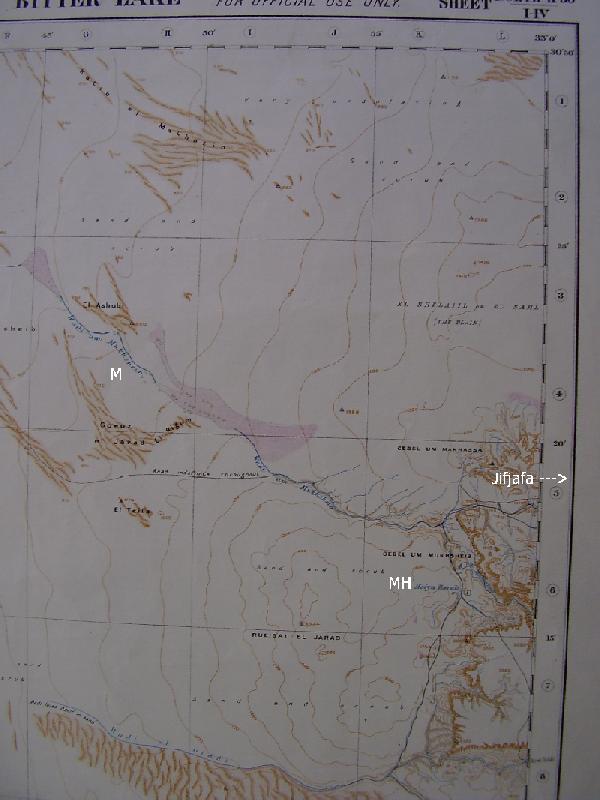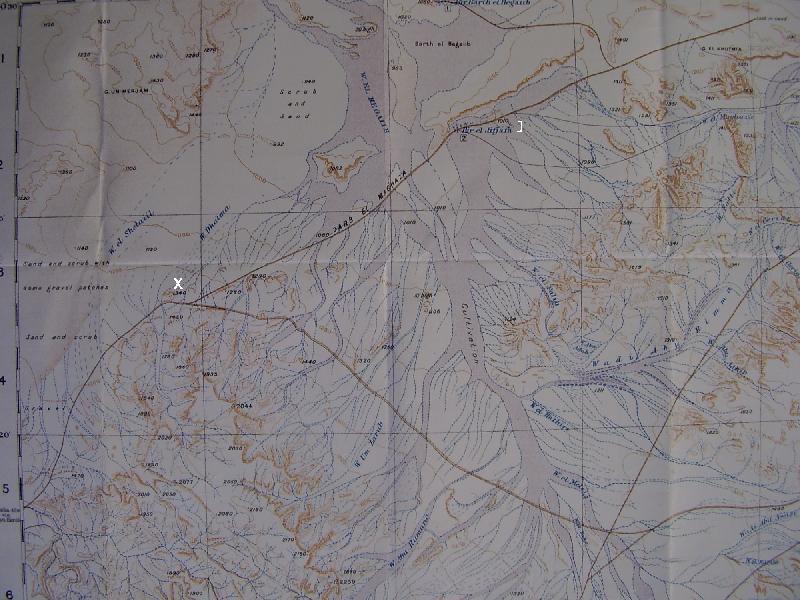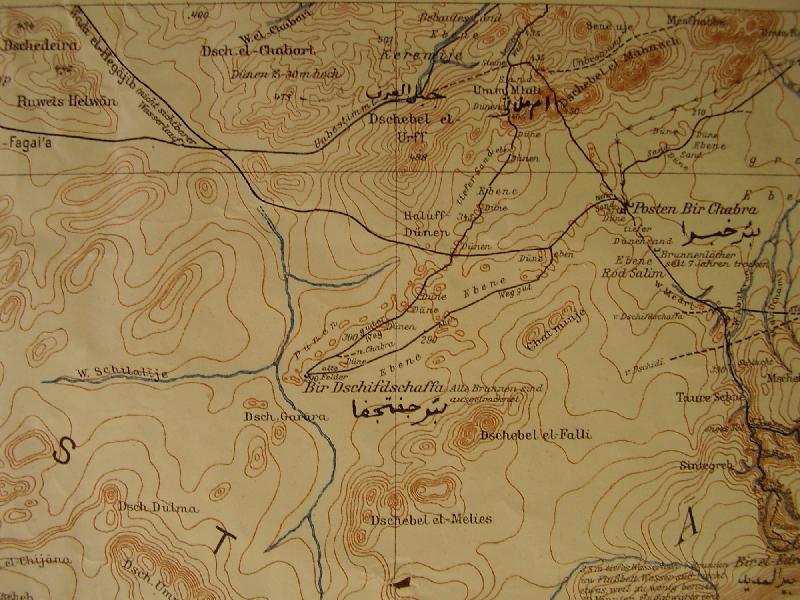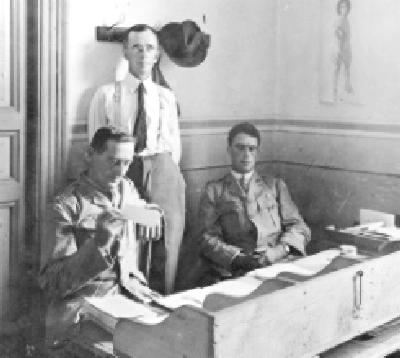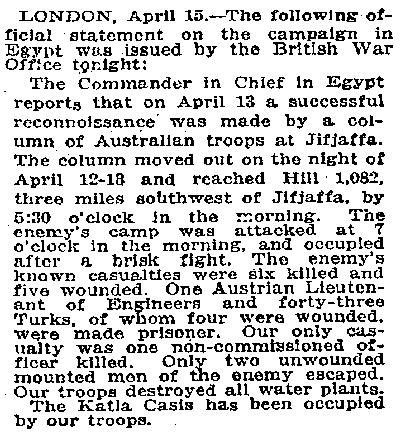From Romani could be seen, some forty miles across the broken and rolling sand-hills to the south, the gloomy, barren mass of the ranges of central Sinai. Waterless, except at occasional wells, and served only by lonely, narrow tracks which were always hazardous, and often impossible, for wheeled transport, these mountains were still in the possession of the Turks, and were a constant, if not a serious, menace to the British force advancing east along the seaboard. Murray's plan was to deal finally with the Turkish posts in the hills after he had reached El Arish; but it was decided in October to make an exception to the general scheme, and to endeavour to storm the Turkish stronghold at Maghara, from which troops had debouched by the passes during the Romani fighting.
Maghara, an old settlement made up of a few stone houses, is perched on the northern shoulder of the range, about fifty miles south-east of Romani. A narrow defile, in places not more than twenty feet wide, falling steeply through the harsh, yellow, sandstone rocks, gives the settlement access by the Wadi Baba to the plain below. Running along the foot-hills upon either side of the mouth of the Baba is a narrow flat of hard ground, clear except for a few mimosa bushes, and showing signs of cultivation. From this flat towards Bayud, to the north, stretches one of the most desolate and difficult expanses of sand-dune country in all northern Sinai.
A column made up of the 11th and 12th Light Horse Regiments, one regiment of City of London Yeomanry, and 300 troops drawn from the camel companies, supported by two guns of the Hong Kong and Singapore Battery, was placed for the raid under the command of Major-General A. G. Dallas'-who afterwards led the unlucky 53rd Division at Gaza-with Brigadier-General S. F. Mott as second-in-command. From Bayud, where the column assembled, to Maghara is only twenty-five miles, and, allowing for the circuitous route through the sand-hills, the march would not exceed thirty-five. Over normal, well-watered country preparations for such a raid by a small mounted force would entail very little work or consideration. But, in view of the country to be covered, the arrangements were exceptionally elaborate. The force contemplated did not exceed 1,100 dismounted rifles; but water and rations had to be provided for men and horses for four or five days, and when the column moved out from Bayud its total strength, including native camel-drivers, was 5,000 men, 2,300 horses, 7,000 camels. The water-supply was drawn from Bayud, where a month earlier the wells had only been capable of supplying half a squadron in twenty-four hours. A squadron of the 12th Light Horse Regiment, under Lieutenant B. Lowing: worked constantly for a month at the improvement of the water, and sank and timbered to a depth of about twelve feet sixteen wells, which were capable of giving an abundant supply to the whole column.
Marching by the stars, the column, with Grant of the 11th Light Horse Regiment and Lieutenant P. Goldenstedt as guides, reached Zagadan and halted there for the day. That night, the 11th Light Horse still leading, the column moved on Maghara. The route wound through the intricate troughs among countless sand-hills devoid of distinguishing features. During the night a dense fog shut off the stars, but Grant, who had a phenomenal sense of locality and direction, kept on constantly at a sound pace through the sandy desolation. Shortly before dawn the horses came suddenly on to hard ground, and a little later, as daylight was breaking, the advanced screen was fired on by a Turkish outpost. The column had emerged from the maze of sand-hills directly in front of the Turkish position. Immediately the Turks fired, the leading troops, under Captain C. A. R. Munro* and Lieutenant Farlow, charged their outposts on the foot-hills at the gallop, although in the fog they had only the rifle-fire to guide them. A few prisoners were taken.
General Dallas's plan was to push the 11th Light Horse Regiment up the heights in the centre straight for the main defences; the 12th Light Horse Regiment and the yeomanry were to work round on the north, while a half-squadron was to advance up the Wadi Baba, which led into the pass. But the fog which enshrouded the range concealed all the objectives. Dallas's orders were identical with those given to Chauvel at Mazar. If the Turks were in strength, he was not to risk his force, but was to consider the operations as a reconnaissance only; accordingly, after consultation with the regimental leaders, he decided merely to make a demonstration and withdraw. The 11th Light Horse Regiment was then ordered to advance on the main front, with the 12th to the right. After the long preparation for the raid, the Australians were exceptionally keen for a fight. Galloping across the narrow flat, they dismounted and advanced up the range with great eagerness. The fog was still heavy, but conditions improved as the men climbed. Covered by overhead fire from the two mountain guns and a number of machine-guns, they ascended a few hundred feet before encountering the enemy, and were then fired upon from a redoubt on a commanding hill. Taking every advantage of the good cover provided by the rough hill-side, a squadron of the 11th crept forward with the bayonet, while the 12th Regiment, on the right, kept the Turks in the redoubt quiet with enfilade fire from machine-guns and rifles. The enemy, who throughout was completely surprised, refused a hand to hand fight, and fled up the heights.
The light horsemen had now accomplished half their ascent, and the worst of the ground was behind them. The main Turkish position was in sight, and the squadron leaders were confident they could carry it without heavy losses. But communications were indifferent; Dallas, having decided only to make a demonstration, now broke off the sporting little engagement, and the light horsemen, intensely disappointed, retired. One Australian was killed and a few men were wounded. Captain Munro won distinction in the bold leadership of his squadron and in a gallant attempt to carry some Turkish wounded out under fire.



